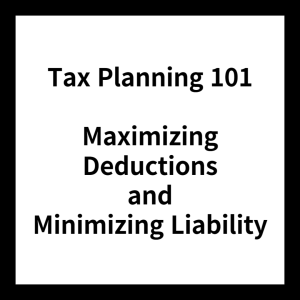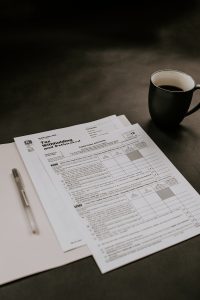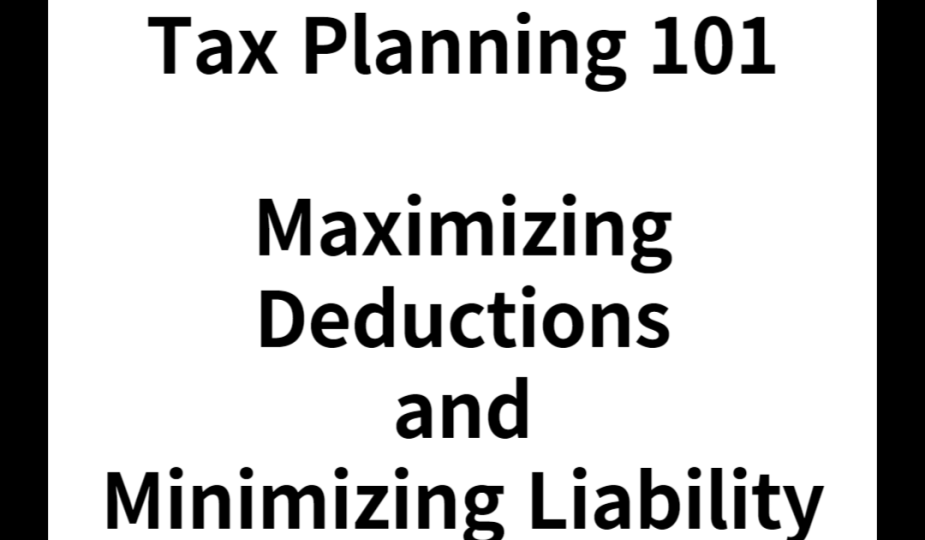# Tax Planning 101: Maximizing Deductions and Minimizing Liability

## Introduction
Tax planning is an essential part of managing your finances.
By understanding the tax laws and utilizing smart strategies, you can maximize deductions and minimize your tax liability.
In this blog post, we will explore some key concepts and tips for effective tax planning.

## 1. Start Early and Stay Organized
The first step to successful tax planning is to start early.
Don’t wait until the last minute to gather your financial documents and sort through tax forms.
Begin the process as soon as possible to give yourself ample time to assess your financial situation and strategize on how to minimize your tax liability.
Staying organized throughout the year is crucial.
Keep track of all relevant financial and tax-related documents, such as receipts, invoices, and investment statements.
Create a filing system or use digital tools to maintain easy access to your financial records.
## 2. Understand and Utilize Deductions
One of the key ways to reduce your tax liability is by taking advantage of deductions.
Deductions are expenses that can be subtracted from your taxable income, thus lowering the amount of tax you owe.
Some common deductions include:
– Mortgage interest
– Property taxes
– Medical expenses
– Charitable contributions
– Student loan interest
– Educator expenses
– Business-related expenses
Research and familiarize yourself with the deductions that may be applicable to your specific situation.
Keep detailed records and consult with a tax professional if needed to ensure you are maximizing your deductions.
## 3. Explore Tax Credits
While deductions reduce your taxable income, tax credits directly reduce the amount of tax you owe.
Tax credits are beneficial as they provide a dollar-for-dollar reduction in your tax liability.
Some notable tax credits include:
– Child Tax Credit
– Earned Income Tax Credit
– Lifetime Learning Credit
– Energy Efficiency Tax Credit
Take the time to research and determine if you qualify for any tax credits.
They can significantly reduce your tax liability and potentially result in a tax refund.
## 4. Contribute to Retirement Accounts
Contributing to retirement accounts not only helps secure your financial future but also offers tax advantages.
Contributions to traditional IRAs and 401(k) plans are tax-deductible in the year they are made, meaning they lower your taxable income.
Additionally, these accounts grow tax-deferred until you withdraw the funds during retirement, potentially resulting in tax savings.
Consider maximizing your contributions to retirement accounts to reap the tax benefits while saving for the long term.
## 5. Take Advantage of Tax Loss Harvesting
Tax loss harvesting is a strategy that involves offsetting capital gains by selling investments that have decreased in value.
By doing so, you can reduce your overall taxable income. This technique is particularly useful for investors who have realized capital gains during the year.
Consult with a financial advisor or tax professional to determine if tax loss harvesting is suitable for your investment portfolio.
## 6. Stay Informed about Tax Laws and Changes
Tax laws and regulations can undergo frequent changes, so it’s essential to keep yourself informed.
Stay updated on any amendments or new legislation that may impact your tax planning strategy.
Consider subscribing to relevant newsletters, following reputable financial blogs, or consulting with a tax professional to stay abreast of any developments.
Being proactive will help you make informed decisions to maximize deductions and minimize your tax liability.

## Conclusion
Tax planning is an integral part of managing your finances and achieving your long-term financial goals.
By starting early, understanding deductions and credits, contributing to retirement accounts, utilizing tax loss harvesting,
and staying informed about tax laws, you can effectively reduce your tax liability and keep more money in your pocket.
Remember, tax planning is a complex and ever-changing field.
While this blog post provides an overview of key strategies, it is important to consult with a tax professional to customize your approach based on your specific circumstances.
Let tax planning be an ongoing process that helps you optimize your financial well-being.





